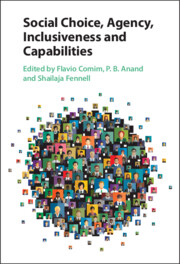Book contents
- Social Choice, Agency, Inclusiveness and Capabilities
- Social Choice, Agency, Inclusiveness and Capabilities
- Copyright page
- Contents
- Figures
- Tables
- Contributors
- Preface and Acknowledgements
- 1 Introduction: social choice, agency, inclusiveness and capabilities
- Part I Social Choice and Capabilities
- Part II Inclusiveness, Social and Individual Agency
- Part III Social Choice and Capabilities in Action
- Index
- References
Part II - Inclusiveness, Social and Individual Agency
Published online by Cambridge University Press: 28 March 2024
- Social Choice, Agency, Inclusiveness and Capabilities
- Social Choice, Agency, Inclusiveness and Capabilities
- Copyright page
- Contents
- Figures
- Tables
- Contributors
- Preface and Acknowledgements
- 1 Introduction: social choice, agency, inclusiveness and capabilities
- Part I Social Choice and Capabilities
- Part II Inclusiveness, Social and Individual Agency
- Part III Social Choice and Capabilities in Action
- Index
- References
Summary

- Type
- Chapter
- Information
- Social Choice, Agency, Inclusiveness and Capabilities , pp. 137 - 302Publisher: Cambridge University PressPrint publication year: 2024

